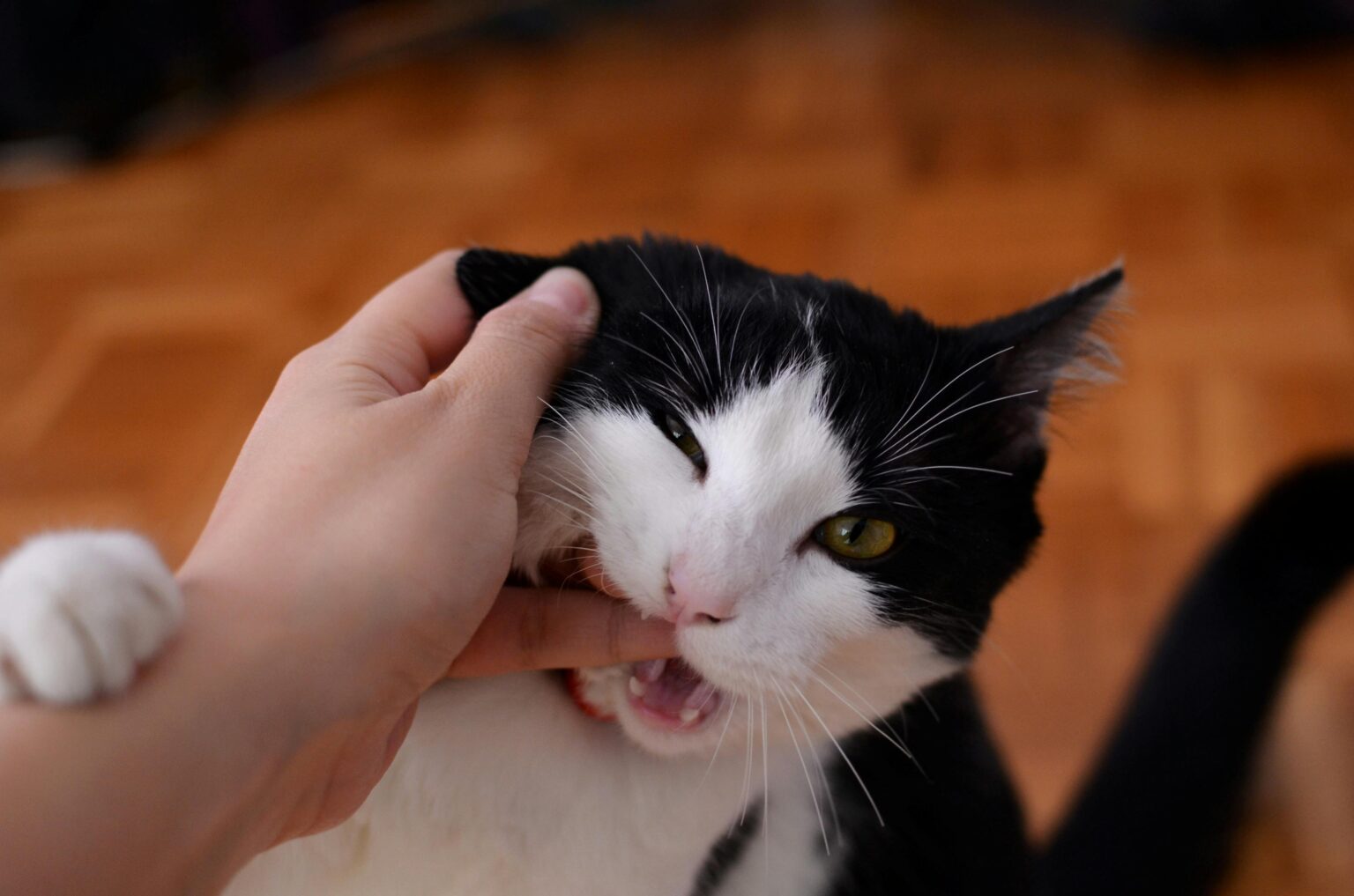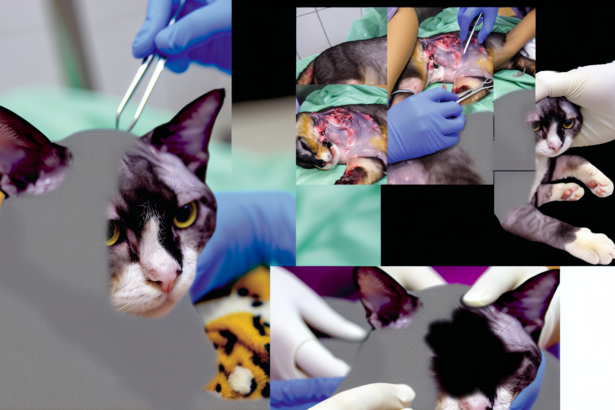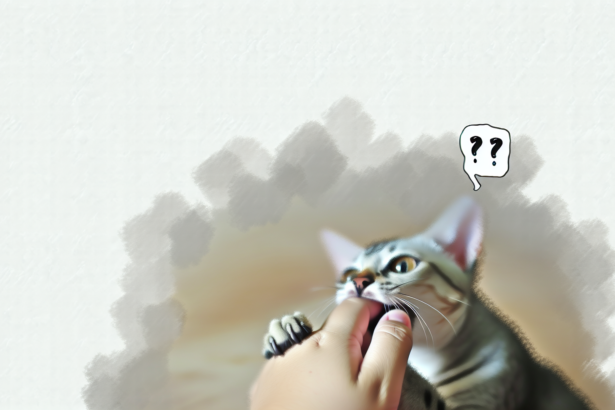Your cat bites to express affection
Affectionate nibbling: a sign of feline love
Why do cats bite? Well, sometimes it’s just their way of saying “I love you”! Yes, those gentle nibbles you feel on your fingers or arm are often a sign of affection.
- Your cat bites to express affection
- Affectionate nibbling: a sign of feline love
- Why does your cat bite you during cuddles?
- Bite wounds: how to manage them on a daily basis?
- Your cat bites due to stress or anxiety
- Identifying signs of stress in your cat
- Common situations that stress your cat
- Effective solutions to soothe a stressed cat
- Your cat bites to play or out of boredom
- Game bites: understanding this natural behavior
- Is your cat bored? Signs not to be missed
- Stimulate your cat to avoid boredom bites
- Your cat bites because of a health problem or pain
- Recognizing a bite related to physical pain
- Dental problems: a frequent cause of bites
- Other health concerns that may explain bites
- Conclusion
- Aggressive bite vs. affectionate nip: an affectionate bite is usually gentle, controlled and accompanied by purring or licking.
- Physical signs of affection: tail raised, eyes half-closed, purring and affectionate head taps.
- React positively: don’t abruptly withdraw your hand, but gently redirect his attention to a toy or stroke him calmly.
Why does your cat bite you during cuddles?
You’re in the middle of a cuddle session, everything’s going well and suddenly… ouch! Your cat bites you. But why does he do that? Quite simply because your little companion has reached his tolerance threshold for petting.
- Identify limits: every cat has its own sensitivities: some love long petting sessions, others prefer short, gentle cuddles.
- Subtle signals: ears slightly back, wagging tail, dilated pupils or staring eyes indicate that your cat has reached its threshold.
- Practical tip: watch your cat carefully for these signals, and stop stroking before he feels over-stimulated.
Bite wounds: how to manage them on a daily basis?
These affectionate nibbles can become a nuisance if they’re too frequent or too loud. Fortunately, there are gentle solutions to manage this behavior.
- Gentle techniques: divert his attention with a suitable toy as soon as he starts chewing.
- Positive reinforcement: reward your cat when it expresses affection without biting, for example with a treat or a cuddle.
- Common mistake to avoid: never punish your cat for affectionate nibbling, as this could damage your relationship and increase stress.
To find out more about this topic, discover how to better interpret your cat’s affectionate behaviour in our dedicated article: How does my cat show affection?
Your cat bites due to stress or anxiety
Identifying signs of stress in your cat
Your cat may also bite when feeling stressed or anxious. Knowing how to identify these signs will enable you to act quickly to help her.
- Typical behaviors: excessive grooming, isolation, sudden aggression, loss of appetite.
- Triggering factors: moving house, new pet, loud noises or sudden change in routine.
- Bite differentiation: a stress-related bite is often rapid, unpredictable and accompanied by signs of anxiety.
Common situations that stress your cat
You’d be amazed at how your own stress can affect your cat’s!
- Changes at home: moving house, arrival of a baby or a new pet.
- Unusual noises: construction work, thunderstorms, fireworks.
- Your own stress: your cat senses your emotions and may reflect them in its behavior.
Effective solutions to soothe a stressed cat
- Natural techniques: comfortable hiding places, soft music specially designed for cats.
- Soothing pheromones: feline pheromone-based diffusers or sprays to calm your cat.
- Practical tip: create a calm, secure space where your cat can take refuge when feeling stressed.
To better understand how to manage feline anxiety, take a look at this comprehensive veterinary study on stress in cats published by Cornell University: Stress in Cats – Cornell University.
Your cat bites to play or out of boredom
Game bites: understanding this natural behavior
Your cat is a born hunter! Using his teeth during play is perfectly natural for him.
- Playful vs. aggressive bite: light play bite, without growling or aggressive posture.
- Importance of interactive play: channels energy and avoids undesirable behavior.
Is your cat bored? Signs not to be missed
- Typical behaviors: destruction of objects, excessive meowing, compulsive licking.
- Boredom-related risks: chronic stress, weight gain, behavioral problems.
Stimulate your cat to avoid boredom bites
- Interactive toys: fishing rods, treat dispensers, automatic toys.
- Simple activities: short but regular sessions of daily play.
- Practical tip: vary your toys regularly to keep your cat interested.
Find out how to choose the best toys for your cat in our guide : The best cat toys.
Your cat bites because of a health problem or pain
Recognizing a bite related to physical pain
- Signs of pain: unusual aggressiveness, refusal of contact, cowering posture.
- Common pathologies: osteoarthritis, infections, injuries.
- Seek rapid advice: if your cat suddenly changes its behavior, make an appointment with your vet.
Dental problems: a frequent cause of bites
- Symptoms: bad breath, difficulty eating, excessive salivation.
- Oral hygiene: regular brushing, appropriate diet.
Other health concerns that may explain bites
- Neurological or joint disorders: unusual movements, difficulty getting around.
- Digestive discomfort: vomiting, frequent diarrhea.
- Regular veterinary follow-up: essential to prevent these problems.
Conclusion
Understanding why cats bite is essential to improving your relationship with them and ensuring their daily well-being. By accurately identifying the cause of biting, you’ll be able to adopt the right attitudes and solutions. For even more practical advice and cat tips, keep exploring our Pawtounes.fr blog!







